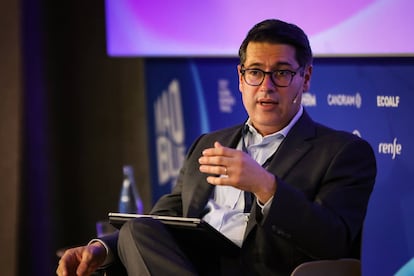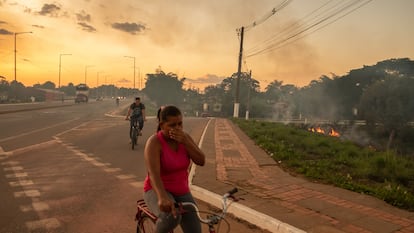Ricardo Mourinho, Vice President of the European Investment Bank: ‘Latin America is crying out for climate action’
A report from the institution — the lending arm of the European Union — reveals that nine out of 10 Latin Americans believe climate change impacts their lives


Climate change denialism hardly has any support left in Latin America. Not only do nine out of 10 residents of the region believe that climate change is a reality, they also claim to have already felt its impact in their day-to-day lives. Thus, 80% of those surveyed in the region demand stricter policies to eradicate it.
These are some of the figures provided by the latest report from the European Investment Bank (EIB) in a report published this past week during the Finance in Common Summit (FiCS), a key event to draw a roadmap for European-financed development in Latin America. “There’s a total consensus [in Latin America]... probably greater than what exists in Europe,” affirms Ricardo Mourinho, Vice President of the EIB. “Citizens are clamoring for climate and democratic action… if 90% [are doing so], governments have to take action.”
In Latin America and the Caribbean — the most biodiverse continent and one of the most affected by global warming — the percentage of climate change deniers barely exceeds 5%, according to the survey. Every year, more than 20 million people are forced to leave their homes and relocate due to the increasing frequency and intensity of extreme weather events, which have doubled over the last two decades. “Climate migrants are a reality here, in the Middle East, in Africa… we must invest in adaptation to ensure that people can stay in their places of origin safely and earn a livelihood,” the Portuguese banker emphasizes, in an interview with EL PAÍS.

Despite the fact that the world we live in has already changed and climate migration is the only option for hundreds of thousands of people, climate financing doesn’t seem to be aligned with reality. Barely 10% of this financing is earmarked for adaptation measures, with more lucrative projects getting the rest. “This percentage has to increase to 15% or 20%. And we’re doing it, by making loan terms more flexible, with more dialogues with governments. [We’re also] including clauses in our contracts for when natural disasters occur,” the banker explains.
An adaptation measure would be, for example, the restoration of 10% of the deforested area in the Amazon, as Colombian President Gustavo Petro insisted on during the closing ceremony of FiCS: “One of the best ways to contribute to the fight against the climate crisis is by recovering the millions of hectares deforested in the Amazon, [which has occurred largely due to] extensive cattle ranching. Can someone lend me money to get it back? Because it’s not economically profitable. Socially, yes, but not economically,” Petro said, adding: “the way to measure impact has to be different.”
To find solutions towards a social, green and digital Latin America, a meeting will be held between the finance ministers from EU, Latin American and Caribbean countries. It will take place on September 15, in Santiago De Compostela, Spain. During this informal summit, the ministers will outline where the €45 billion ($48 billion) promised by the EU until 2027 will go. It will be transferred through the EU’s Global Gateway initiative, an investment and cooperation platform in Latin America and the Caribbean. The goals include reducing poverty and joining forces for a digital transformation, while encouraging cooperation for a fair and green transition.
China is the second country (after the United States) with the highest level of investment in the region. However, the vice president of the EIB assures EL PAÍS that this doesn’t concern him. “It’s not about competing,” he says. “Negotiations with the EU are long-term. Europe has the ambition to increase its economic, political and commercial relationship with Latin America. And we want to do so with the principles of Europe: freedom, democracy and the rule of law. That’s what’s most important.”
Mourinho explains that one of the priorities that will be discussed during the meeting of finance ministers will be the conservation of oceans, which are among the largest oxygen generators on the planet and among the most important temperature regulators. At the recent Finance in Common Summit in Cartagena, Colombia, an agreement between eight development banks — including the EIB, the CAF-Development Bank of Latin America and the Caribbean and the Inter-American Development Bank (IDB) — was made public.
“If there’s no blue economy, there can be no green economy. It would only be yellow,” Mourinho jokes. “We will achieve this with two plans: one for the management of waste that reaches the seas and oceans, and another for supporting the economies of the sea: fishing, preservation of mangroves, and marine biodiversity.” The statement reads that the roadmap will bring together knowledge and experience from all ocean investments and identify unfilled funding gaps and realistic funding opportunities.
According to the EIB survey, among the most tangible consequences of climate change are the economic ones. Seven out of 10 Latin Americans claim to have seen their income or sources of livelihood decline as a result of weather events or temperature changes. And half of the 10,500 respondents — who hail from 13 countries in the region — say they have suffered health problems because of climate change.
Another policy that seems to be gaining ground in the negotiations is the opening of a carbon market. Asked about the disagreements between large gas-emitting companies with communities that wish to protect biodiversity, Mourinho is blunt: “If there’s no good environmental regulation in the countries, we’re not going to invest.”
Sign up for our weekly newsletter to get more English-language news coverage from EL PAÍS USA Edition
Tu suscripción se está usando en otro dispositivo
¿Quieres añadir otro usuario a tu suscripción?
Si continúas leyendo en este dispositivo, no se podrá leer en el otro.
FlechaTu suscripción se está usando en otro dispositivo y solo puedes acceder a EL PAÍS desde un dispositivo a la vez.
Si quieres compartir tu cuenta, cambia tu suscripción a la modalidad Premium, así podrás añadir otro usuario. Cada uno accederá con su propia cuenta de email, lo que os permitirá personalizar vuestra experiencia en EL PAÍS.
¿Tienes una suscripción de empresa? Accede aquí para contratar más cuentas.
En el caso de no saber quién está usando tu cuenta, te recomendamos cambiar tu contraseña aquí.
Si decides continuar compartiendo tu cuenta, este mensaje se mostrará en tu dispositivo y en el de la otra persona que está usando tu cuenta de forma indefinida, afectando a tu experiencia de lectura. Puedes consultar aquí los términos y condiciones de la suscripción digital.








































